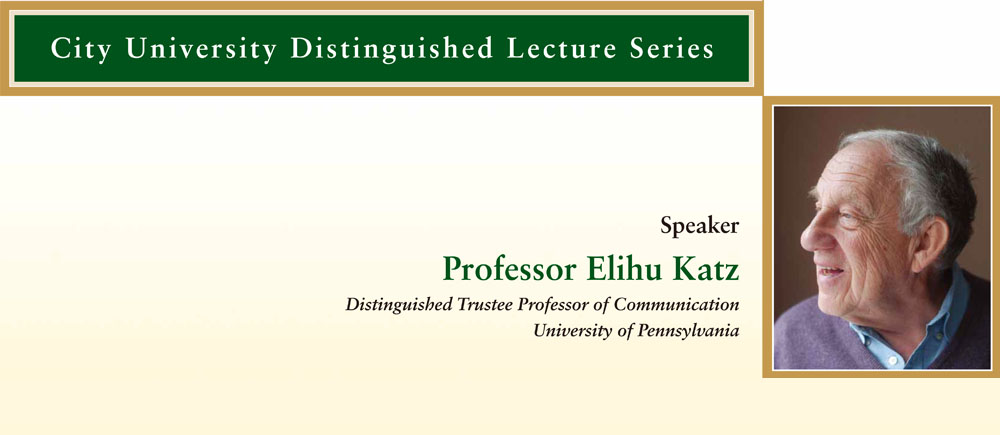
| Date: | 03 December 2010 |
|---|---|
| Speaker: | Prof. Elihu Katz |
In this lecture, Professor Katz will review his experience, and some conclusions, from work in the field of international communication. He will recall his share in the l950s analysis by Columbia University’s Bureau of Applied Social Research of public opinion and communication in four Arab countries and Turkey. He will highlight Daniel Lerner’s (1958) proposal that the “empathy” produced by media exposure is a major key to the modernization of these societies. Secondly, he will discuss how research on the international diffusion of ideas and things — throughout recorded history — shifted attention from the study of short-run persuasion to the spread of social and cultural change over time and via social networks.
Professor Katz will connect the work on diffusion with other traditions of social science, including rural sociology, archaeology, history of religion, etc. Third, he will recall his study, with George Wedell, of the establishment of television broadcasting in eleven then-developing nations. Fourth, he will review his work on intercultural communication evidenced by the problems of interaction between Western-type bureaucracies in Israel and the mass of immigrants who arrived from traditional societies. Fifth, he will illustrate how the live broadcasting of historic occasions — so-called “media events” — can mobilize entire societies, and sometimes the whole world, to share the collective experience of reconciliation, as in Anwar Sadat’s gesture to Israel, or of devastation, as in 9/11. Sixth, he will report on the experience of studying how a genre of entertainment — the nighttime soap opera ‘Dallas’ captivated the whole world, albeit not simultaneously. And, finally, he will query the performance of international almost-stateless media such as CNN in situations of crisis such as the Gulf War.
Professor Katz will offer some conclusions, and some freer associations, based on these experiences. He will return to the current revival of Lerner’s “empathy” to illustrate how narrowly media effects have been defined in the field, and to provide an unusually compelling example of the cognitive, emotional and moral ways in which the contemporary consumer of international communication is being conceptualized.
Professor Elihu Katz is Distinguished Trustee Professor at the Annenberg School for Communication, University of Pennsylvania.
Professor Katz has the vision and passion for media and communication research that has spanned more than six decades. The first major empirical work in media studies was the People’s Choice (1944) by Paul Lazarsfeld and his colleagues at Columbia University, in which they refuted the thesis that the media exerted direct effect on the electorate and, instead, proposed a “two-step flow of communication” hypothesis that identified “opinion leaders” as mediators between the media and the masses. This hypothesis was tested in a more comprehensive context, by Katz and Lazarsfeld (Katz’s mentor), resulting in the publication of Personal Influence (1955), a classic that has set the agenda for six decades of sustained research on media effects. Professor Katz subsequently did another milestone study on the diffusion of medical innovations in American communities with James Coleman and Herbert Menzel. Since then he has published a total of 23 books and countless articles.
Professor Katz probably has no equal in breaking so many research grounds. Almost all of the areas and topics he initiated — ranging from media effects, diffusion of innovations, secularization of culture, political communication, uses and gratification of the media, media events and international diplomacy, comparative broadcasting systems, to intercultural interpretations of media texts — have created new paths to inspire large amounts of research in the field. He is one of the best-known media sociologists to the wider intellectual community.
Throughout his long academic career, he has been dividing his time between the United States and Israel. He was the first director of the Israeli Television, founded Hebrew University’s Communication Institute, and served as former director of the Institute of Applied Social Research in Israel.
He is an elected member of the American Academy of Arts and Sciences. He is a recipient of William F. Ogburn Career Achievement Award presented by the American Sociological Association, the UNESCO-Canada McLuhan Prize, the Burda Prize in media research, and other distinctions. He has received honorary degrees from the Universities of Ghent, Montreal, Paris, Haifa, Rome, Bucharest and Quebec.